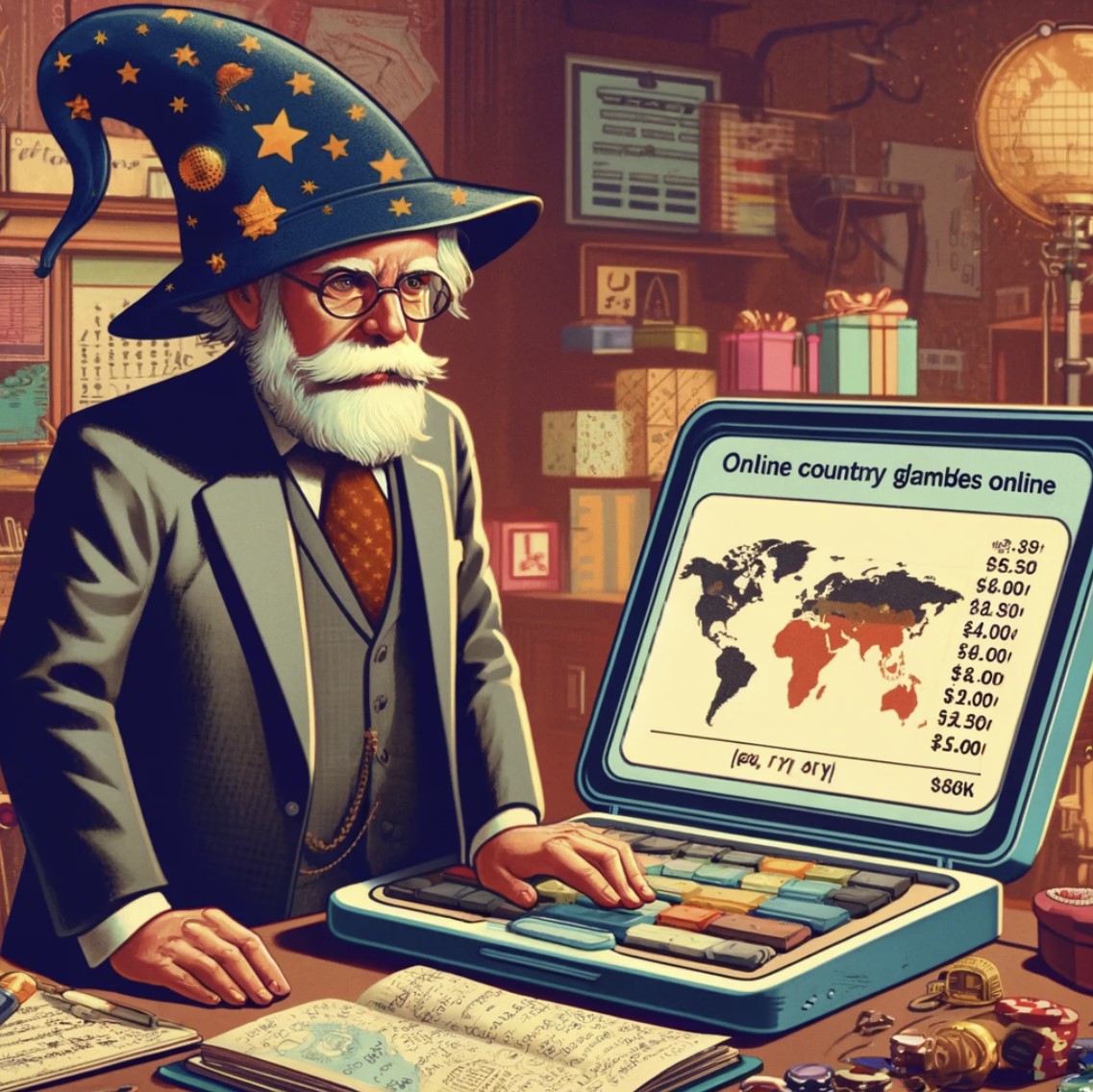On this page
Comparing the Gambling Proclivities of the Countries
On this page
Introduction
Back in 2016, I created a page for this site to discuss the proclivity of gambling throughout the United States.
This breakdown consisted of a few key metrics:
- What forms of gambling were legal in a state?
- How much money did each resident of a state lose in each form of gambling?
- How much money, per resident, did gambling bring in?
Unfortunately, for the last question, the only hard data available was revenue from State Lotteries as well as revenue from Commercial Casino Gambling (licensed through the state) and Tribal Gambling numbers (which could only sometimes be located.)
Not surprisingly, being the home of Las Vegas, Nevada led the way in the most money lost per resident. We know, of course, that the money was primarily not lost by residents of Nevada, but rather, visitors.
What we are going to do for this page is look at gambling tendencies across the world in an effort to answer, Which country has the greatest proclivity for gambling?
First of all, I would like to thank Economist.com for inspiring this article by looking into the biggest countries in the world for overall and per resident gambling loss on this page.
And, I will be attempting to go a little bit more in depth and expand upon those.
 Ohio Recommended Online Casinos
View All
Ohio Recommended Online Casinos
View All
Immediately, we notice that overall gambling has been on the rise over the last several years as it seems that each year breaks the record from the year before that! Do people just have that much more money to lose gambling? Is gambling itself becoming a more popular thing to do? Did people stop going to movies, eating out or doing other recreational activities?
The answers to the question, "Why is more money constantly being spent on gambling?" are actually quite a bit simpler than one would expect. It's pretty much common sense, in fact:
Why Might Gambling Revenues Constantly Increase?
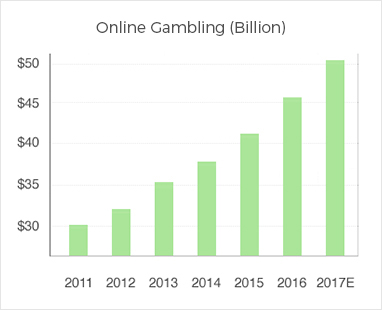 1.) More Money to Gamble
1.) More Money to Gamble
-When people look at the economic conditions in their country, such as the United States, what they fail to realize is that the United States labor and stock markets tend to just be representative of the economic conditions of the world as a whole. This is also true for the markets of other countries and continents as you can see here.
If you look at the far right of the table, you will notice a three-year chart for each of these indices. What you will notice is basically a sea of green with only a few of these indices down over a three-year period.
The United States can have a significant impact on the world market, which is one of the reasons that we see China down over three years as well as dramatically down this year. Investor confidence in China has dropped a bit as its biggest market, namely the United States, has decided to increase the tariffs on Chinese-manufactured goods. The necessary result of that is that United States retailers especially, but also other industries in the United States, are going to be more inclined to get their materials and/or sale items from elsewhere, if not discontinue the use of the goods entirely.
The Dollar Tree is an example of a retailer that epitomizes low prices. Namely, every single item in the entire store costs $1, or less. As a result, the Dollar Tree must buy its items for sale as cheaply as possible, which often entails buying items in bulk that have been manufactured in China. This is demonstrated in the USA Today article thus:
From the USA Today article:
Late last month, President Donald Trump slapped a 10 percent tariff on $200 billion worth of Chinese imports. Unlike previous rounds of tariffs on Chinese products, which largely taxed industrial goods, the new duty touches everyday consumer items.
The result is that there will be a total of 20 billion dollars paid just in tariffs which, simply put, are just a tax on imported goods. The effect becomes more clear if you look at Dollar Tree's stock value just in the last year, which has cratered.
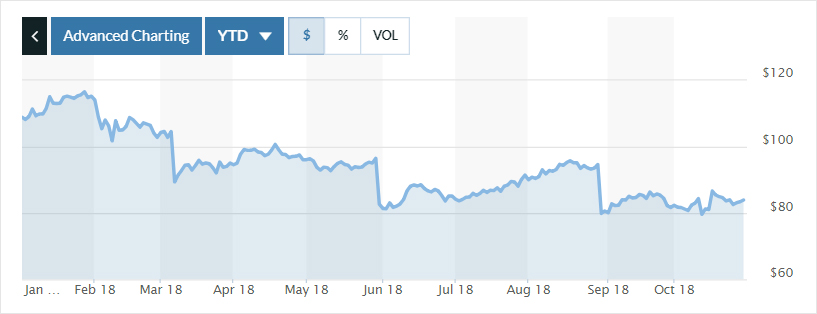
The vast majority of the global markets are trending positive, though, just as they trended negative when the United States was going through the "Great Recession." Once again, it can't be denied that the United States, by itself, is a significant global force that accounts for a not insignificant percentage of all world spending.
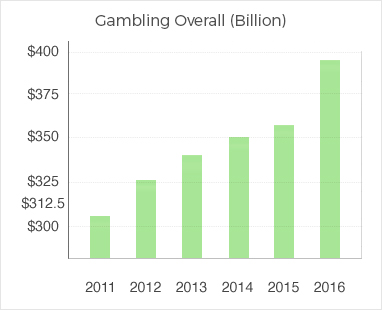 If the question is, "Do people have more money?" the answer is a resounding: YES!
If the question is, "Do people have more money?" the answer is a resounding: YES!
For instance, you can even look at these figures from world employment rates, as of most recent reporting.
This employment rate is what we would term in the United States as, "Labor Force Participation Rate," in other words, out of everyone who could theoretically be employed, what percentage are. There is going to be some variation from one country to another over exactly what this entails, but it doesn't change the fact that almost all countries are presently closer to their record highs than they are their record lows.
Regardless of whether or not global wages are going up, (they are) the fact of the matter is that more global income and greater workforce participation results in a greater amount of discretionary income, which means greater spending on stuff that you like to do. Gambling itself doesn't necessarily need to become more popular (even though it is) in order to generate greater worldwide revenues, the only thing that needs to happen is that the people of the world have to have more money with which to gamble.
What about those who are already working?
The Economic Left in the United States is clamoring for higher minimum wages, mostly to benefit those who are employed in the tertiary (customer-facing) economic spectrum, but perhaps rightfully so. While many states have minimum wages that are less than $10/hour, we see that the average hourly wage is ever-increasing.
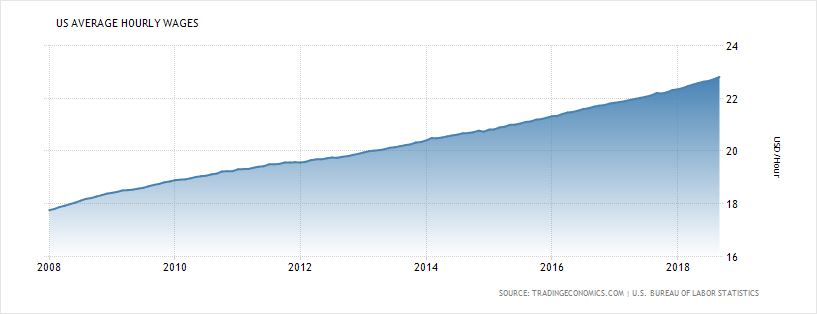
That page also includes a chart on the bottom which discusses the average wages (sometimes quarterly, sometimes monthly, sometimes yearly) for different countries throughout the world. It should come as no surprise that all of these numbers are at, or near, all-time highs.
Even throughout the Great Recession, pulling back to the ten-year chart for the United States, the average wages never stopped increasing. Granted, the Labor Force Participation Rate was dropping substantially, but even with that, the average wages continued to climb. The reason for this is pretty simple: It's kind of tough to convince an employee to take less than he or she was already making.
Ultimately, you have more people working whose wages grew from $0 to whatever they became after they found work combined with the ever-increasing wages that people are earning across the entire world. As mentioned before, most economies are not terribly unique unto themselves but are rather just a subset of what the world economy is doing. It usually takes a pretty major event for a country to diverge dramatically from what the rest of the world is doing.
Anyway, even if there were not one new gambler to be had...gambling revenues would still be increasing as people enjoy more disposable gambling income.
While we are on the subject of gambling's popularity...
2.) Gambling is Ever Expanding
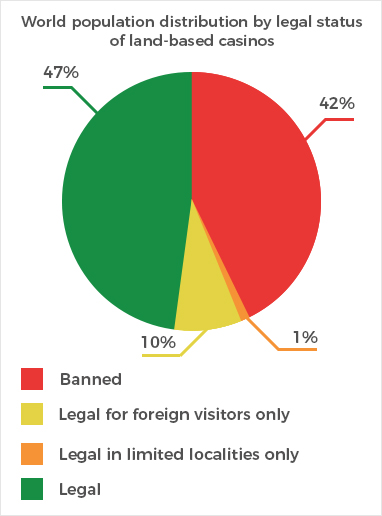 We have already addressed that people who are inclined to gamble now have more money to do so, given the labor force participation rates. Another important question is whether or not there should inherently be more gamblers in the world than there have been?
We have already addressed that people who are inclined to gamble now have more money to do so, given the labor force participation rates. Another important question is whether or not there should inherently be more gamblers in the world than there have been?
Rather than look for every law change throughout the entire world, let's just look at some recent gambling-related events to take place in the United States for the answer to this question.
One relatively recent major event to spring to mind that we have not even seen the effects of yet is that, on May 18, 2018, the Supreme Court of the United States overturned PASPA.
I've written extensively about PASPA, including a mention in this edition of News & Notes.
When it became apparent that this matter might make it to the SCOTUS.
We're not going to get into the nuances of what exactly PASPA did, except suffice it to say that it restricted sports betting in all but a few states.
There have been some arguments from both sides on exactly how much illegal sports wagering took place in the United States prior to the SCOTUS striking PASPA.
But, it is almost certain that the wagering totalled well over 100 million dollars annually.
Given that PASPA is gone, it is simply incumbent on any state desirous to allow sports betting operations to legalize same and set up a regulatory and revenue taxation framework. Certainly, some states that allow other forms of gambling will choose not to permit sports betting, and other states (Hawaii, Utah) that have no legalized forms of gambling whatsoever will almost certainly not allow it. Further, some casinos may quite simply choose not to have it. In the case of Pennsylvania, the regulatory framework that was established and the fees, therefore, do not nearly justify the casinos potential profits...so they need to go back to the drawing board with that one.
Either way, sports betting represents a form of gambling that was illegal, and relevantly, was taking place anyway which will not be legal in a greater number of jurisdictions with such revenues contributing to the worldwide numbers.
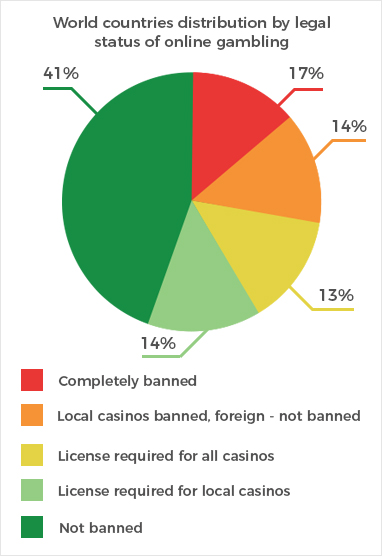 Another example is the legalization of online gambling in the State of New Jersey a few years ago provided the online gambling site has ties to a physical casino within the state. This has also become the case in Pennsylvania and can fully well be expected to expand to other states as well as other countries throughout the world.
Another example is the legalization of online gambling in the State of New Jersey a few years ago provided the online gambling site has ties to a physical casino within the state. This has also become the case in Pennsylvania and can fully well be expected to expand to other states as well as other countries throughout the world.
More Casinos + Gambling
In the last fifteen years, the United States has lit up like a Christmas tree in terms of states that allow casino gambling now compared to the states that did so back then. More than that, Tribal Gaming has also gained a footing in a wider range of areas.
One of the most recent examples is the Encore Casino going up in Boston Harbor as of the time of this writing. The license was approved just a few short months ago and they will commence gambling operations in mid-2019.
In Idaho, one ballot measure is to allow video terminals that will enable people to bet on historical horse races on a pari-mutuel basis. While this sort of gambling is a far cry from fully licensed and regulated casinos with table games, slot machines, video poker, live poker, sports betting and all of the other forms of gambling, it's still a move in a more liberal direction.
Pennsylvania is said to be considering allowing, "Parlors," which is limited Video Lottery Gambling that is administered directly by the Pennsylvania Lottery Commission. This would be similar to the type of gambling that they have in West Virginia in which operators are permitted to offer a restricted number of Video Lottery Terminals with a restricted number of games and possible return tables.
It's usually a matter of, "Necessity is the mother of invention," which is not actually a Plato quote, by the way. Anyway, as states face budget deficits, that's when they tend to warm up to the possibility of allowing gambling on the whole, or for states that already have certain legalized forms of gambling, expanding it.
3.) More Choices
Imagine if Roulette were the only casino game available in the entire world, just as a thought experiment. There you would have a game in which the biggest potential payout is 35-TO-1 by betting on a single number which consists of a simple wheel spin and a ball dropping into a slot.
The fact is that the game has been a casino staple for...as long as there have been casinos it seems and is known as one of the "Big Three," casino games.
With that, though, there are still people who think Roulette is one of the most boring games on the entire casino floor and who have no desire whatsoever to play it.
Just as many gamblers in the United States will experience a greater range of gambling options as Brick & Mortar casinos in states not named, "Nevada," introduce sports betting; the world and online markets have similarly enjoyed a greater number of choices.
Slot machines are more flashy and dynamic than they once were often with screens as high as ten feet in the air and themed after popular television shows such as Game of Thrones. Skill-based gaming is spreading to multiple states and other countries as we speak while games such as Gamblit Poker have enabled players to have a fun head-to-head gambling option with their friends.
Online Gambling has witnessed a similar expansion as the delivery of Live Dealer Gambling becomes crisper and more closely representative of the live casino atmosphere. More than that, Virtual Reality Casinos are still being developed and we can expect them to be pretty widely available here in the next few years, or so.
It's not only the prospect of choice that drives gambling revenues, it's the very notion of choice itself that contributes. If a player does not like one game, but his/her friends want to remain in the casino, then that player has a multitude of other games that he/she can try with the casinos and manufacturers hoping that the player will eventually find something he/she does like.
Gambling Will Continue to Grow on the World Market:
All three of these factors result in, and will continue to result in, continually increasing gambling revenues on the world market. The biggest one is that Governments are generally becoming less restrictive when it comes to allowing their citizens to gamble in various ways.
While increased competition from one jurisdiction to another may negatively impact the bottom line of individual casinos, both live and online, the fact is that it remains unlikely that overall gambling revenues will ever see a serious decline. People simply love to gamble too much. Short of a massive worldwide economic event that puts a ton of people out of work, everyone can expect these trends to continue.
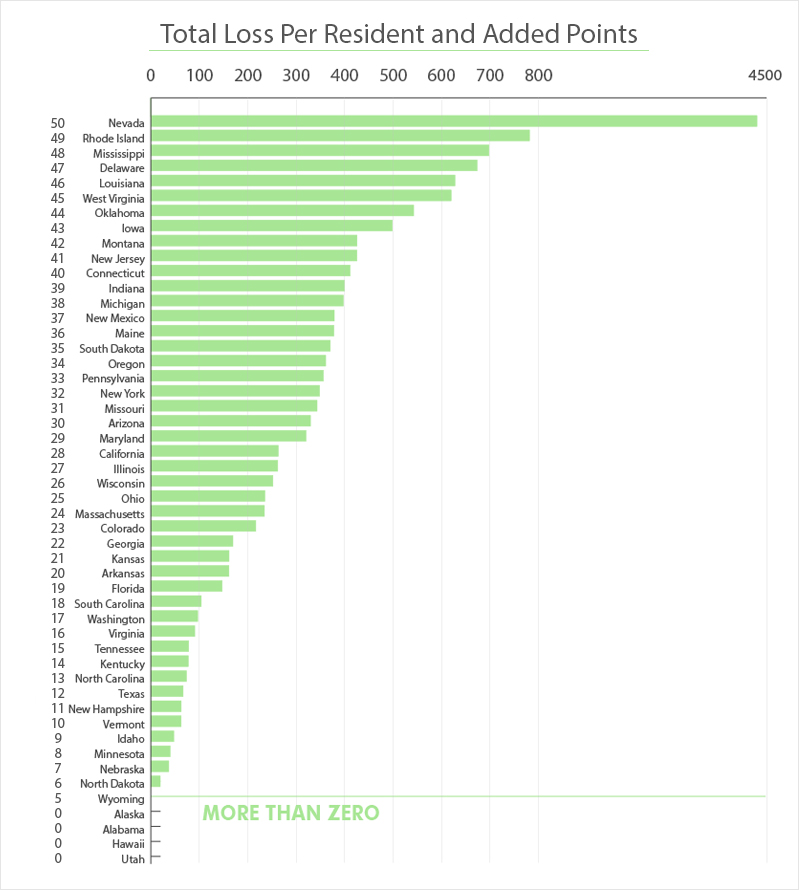
Where Does The Gambling Come From?
The next question that we have to answer is, "Where does the gambling come from?" We certainly know that the gambling dollars are not coming out of the State of Utah, at least, not in the form of any kind of legalized gambling as the state has nonesuch. In fact, as I found on my Proclivity for Gambling in the United States article:
UTAH:
This couldn't be much simpler, if it's gambling, then it is illegal. In fact, Utah specifically amended its laws to make it clear that Online Gambling is illegal, so I'm going to suggest that this state is even less gambling-friendly than Hawaii. At least Hawaii didn't feel the need to amend its code lest there be a shadow of a doubt. -5 Points and they beat Hawaii in the tie.
With that said, in the context of world gambling, we know the United States is going to be a major contributor.
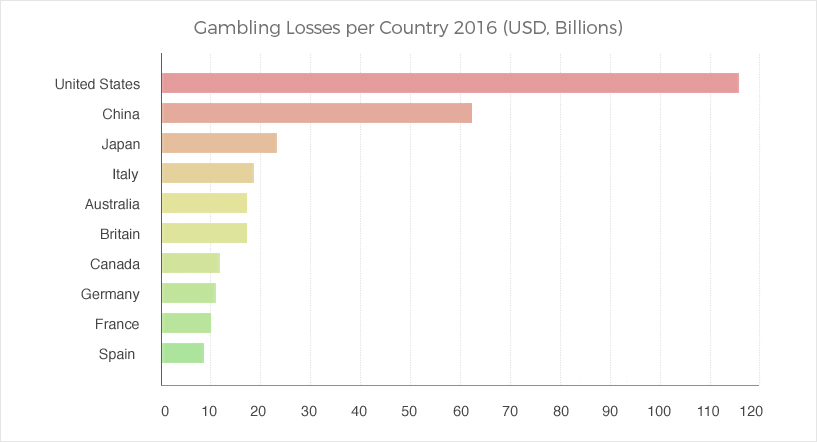
It comes as no surprise that the United States contributes more net money than any other country. Taken as a whole, the United States is one of the most liberal countries when it comes to what sorts of gambling activities are legal in its borders, this despite the fact that multiple states have no legalized form of gambling whatsoever.
The way that the Tenth Amendment, which effectively gives power to the states to handle their own gambling affairs, is actually pretty interesting. The majority of other countries are licensed and regulated through the Government itself or some regulatory body of the Federal Government. One such example is the UKGC (United Kingdom Gambling Commission) which handles the gambling regulation in, you guessed it, the entire United Kingdom.
It's also important to remember that the Gambling Losses per Country chart represents the originating country from which the gambling loss occurred. In other words, it's not saying that this amount of money is necessarily lost by United States citizens, just that it is lost in the United States. Granted, citizens of the United States also gamble and lose money outside of the country, but Las Vegas remains one of the top destinations in the world.
While Las Vegas continues to rely upon non-gambling revenue increasingly, particularly on the Las Vegas Strip, CDC Gaming Reports.
Finds the following (bold added):
Nearly one-half were from the western United States, down slightly from past years; about three in ten were from California. One in six visitors were from foreign countries, and the 2017 visitor base continued the 2016 trend of being more ethnically diverse, as three in ten identified themselves as non-white.
The CDC found that the total visitor numbers came out to 42.2 million, so we can extrapolate that to mean that there were approximately seven million foreign visitors to Las Vegas in 2017.
While it would be tough to know for sure how much was spent gambling from foreigners compared to other visitors, we can probably pretty accurately assume that foreigners are going to tend to stay longer, and as a result, are likely to spend more in general. Some of the visitors from the Western United States, most notably California, were almost certainly day trippers.
Coming in under $500/person, we see that the gambling loss, per person, in the United States is only the fifth highest in the world. That's actually interesting because a good bit of that money is not actually coming from United States citizens, but it also means that we are far from the most gambling-crazed country in the world. According to Investopedia:
1. United States
The United States has the most money per capita, with $41,071 in household net adjusted disposable income per capita. That puts the United States 41.5% above the OECD average. With 319 million people residing in the United States, its economy is the largest in the world, with a gross domestic product (GDP) of $17.4 trillion. The U.S. economy has benefited from a boom in energy production in the last few years and has made the United States number one in oil and natural gas production in the world.
The United States is the world leader in net adjusted income per capita, (In other words, money you can do whatever you want with) so that means that citizens from other countries are spending a greater amount of their disposable income on gambling, not the United States.
Australia
At nearly $1,000 United States dollars in 2016, Australia is blowing out the rest of the world in gambling spend per person. Perhaps not surprisingly, Australia also ranks very high in the world for disposable income, again from Investopedia:
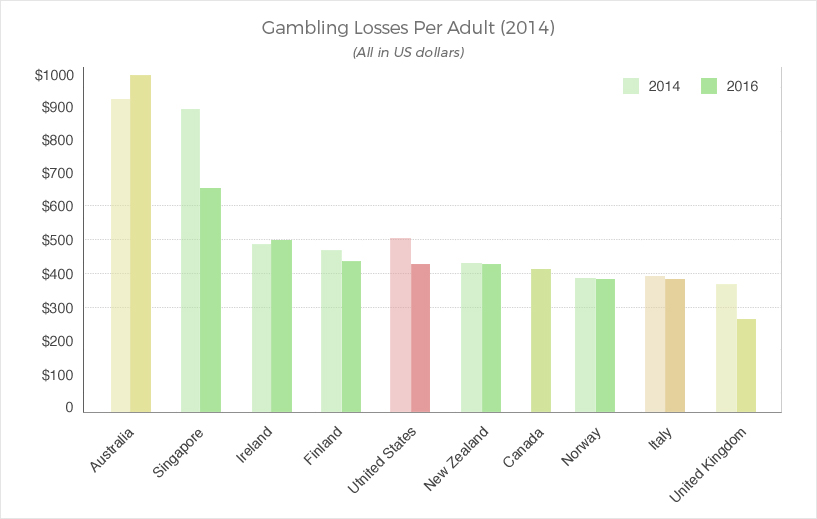
5. Australia
Australia's household net adjusted disposable income per capita is $33,138, which is 14.2% above the average. Australia has a GDP of $1.1 trillion and a population of almost 24 million people. The country is rich with natural resources, which is reflected in one of the primary engines of its economy: mining.
Let's break this down for a second:
That would mean that nearly 3% of all of Australia's net-adjusted disposable income per capita is lost to some means of gambling as compared to just over 1% for the United States. Simply put, Australia loves its pokies and it also has some of the more liberal gambling regulations in the world. Practically every possible form of gambling is expressly legal throughout the country and they also have bars with, "Pokies," in them similar to the parlors enjoyed by states in the United States such as West Virginia and Montana.
Going back to my Proclivity for Gambling page, we see that West Virginia lost the sixth-most per resident, despite the fact that it is a state with only five legal Commercial Casinos. (One of which is technically private)
As discussed above, this comes about because of the other forms of gambling that are legal, mainly convenience gambling forms such as the parlors in West Virginia and the fact that bars, taverns and private clubs (as with Australia) can offer limited Video Lottery Terminal gambling.
Another important comparison with West Virginia and the average loss per resident in the United States as compared to Australia and the United States is that, yes, West Virginians are also doing it with fewer dollars of disposable income compared to the rest of the U.S.
According to the Motley Fool in 2014, West Virginia had among the least disposable income by state.
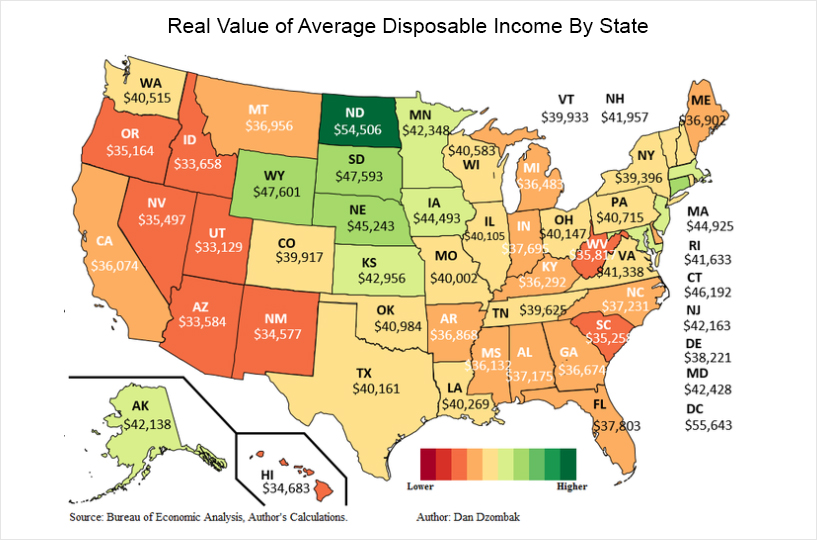
The answer is pretty simple: As the ease and convenience of different forms of gambling increases, so increases the number of dollars lost gambling. That's not even true only on an "All else being equal," basis, it's just almost always true. If it were, "All else being equal," then states with lower disposable income (but high access to gambling) still wouldn't see their residents spend too much gambling. While disposable income is certainly a factor, the big factor is what forms of gambling are legal and how easy they are to access.
In terms of net loss per person gambling, we can expect the numbers for the United States to continue to increase, especially as more states expand/initiate online gambling operations, limited video lottery establishments and sports betting. In the case of Australia, they should remain fairly consistent because it would honestly be difficult for them to get much more liberal with gambling than they already are.
Singapore
The reason for the disparity in Singapore's 2014 numbers compared to 2016 is because of the legalization of online gambling, which started off really hot and then tapered off.
More than that, the Strait Times Index (Singapore's equivalent of the DOW) has looked like this over the last five years:
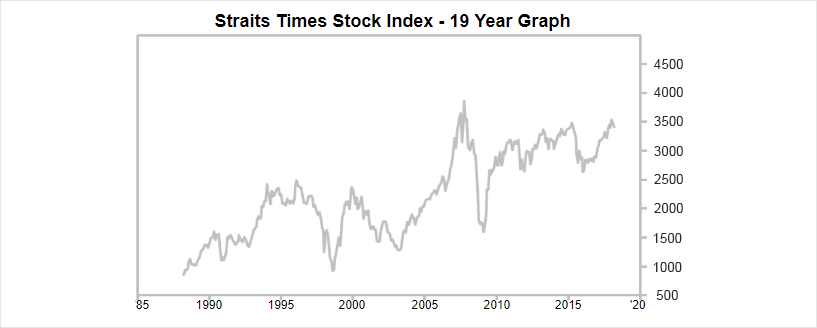
2015 was a very economically tough year for Singapore and 2016 wasn't great, either. It looks like the economy is balancing out and may be on a path to improvement now, but if you jump to Page 13 of this pdf.

You will see that the Strait Times Index also reflected in the average median wages of Singapore residents. Most likely, this was due to increased unemployment numbers during the recessionary period that followed the drop in stock prices.
Once again, while disposable income is not THE factor (you have to have access to gambling in the first place) it is certainly A factor.
Great Recession in the United States
In fact, if you look at the years of the Great Recession in the United States on this chart on Page 2, provided by the UNLV Center for Gaming Research:
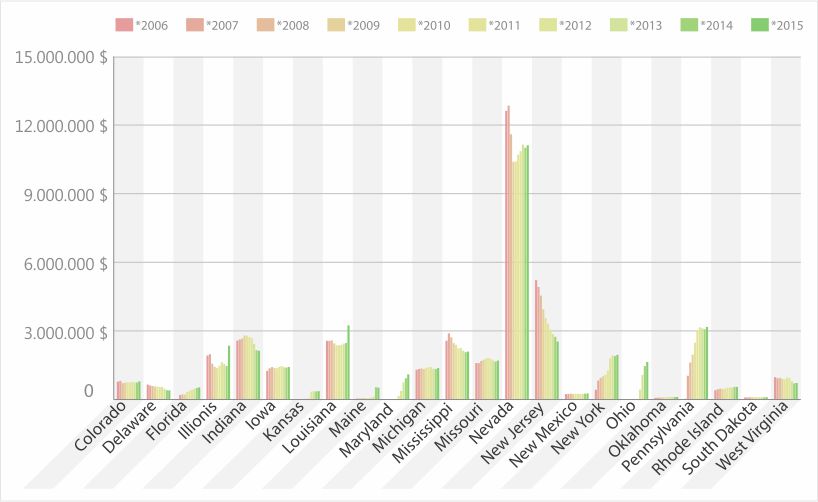
We see that it declined in almost all states between 2008-2010 (or 2011) with the main exceptions being the states to legalize/expand gambling in one way or another, whether Legislatively or through the opening of new casinos. In existing and relatively Legislatively unchanged casino markets, such as Nevada, New Jersey, West Virginia, Colorado, Mississippi and Illinois, they all saw declines following 2007.
Why did Missouri increase in casino revenues, you might ask? The reason is because the state previously had a, "Loss Limit," such that a patron could only buy $500 in chips within a two hour period, and as a result, casinos had table maximums set accordingly.
In 2008, the voters passed a referendum that would eliminate this loss limit, which enabled players to make bigger buy-ins and casino to accept larger maximum wagers, as a result of the fact that players could buy-in for more than $500.
Necessity remains the mother of invention, and as a result, Missouri casino revenues INCREASED throughout the Great Recession, but have since tapered off mostly due to increased competition in nearby states.
Once again, as the ways and means of gambling are increasingly deregulated, people will be more inclined to spend money, or greater amounts of money, on gambling.
With that, it is arguably the case that the United States will one day join Australia in annualized gambling loss on a per person basis, but that is not going to happen until most/all of the states allow relatively unrestricted gambling. Even in certain states, the casinos are in one or a few centralized areas, (think New Jersey with Atlantic City and Colorado with its few locations) thereby being inconvenient for some individuals within the state.
The way to see the most gambling revenue in the United States is for each state to do as West Virginia does and have both lottery and limited Video Lottery Terminal locations. That's how you end up seeing a ton of money get spent on gambling and, by extension, more gambling tax revenues flowing into the state's coffers. What's easier: A one or more hour drive to the nearest loud and bustling casino or a walk down the street to your local pub? For players who are not particularly concerned with having access to a wide range of hundreds of games, the walk to the bar is the superior choice for many of them.
Attracting The Youth

With the seemingly bizarre exception of Roulette on the Las Vegas Strip, Millennials in the United States, as well as other countries, seem increasingly disinclined to gamble. This is even the case in those same Strip Casinos as non-gambling revenues consistently increase and, more importantly, represent a larger percentage of the overall revenues of those casinos...now well over 50% according to the CDC study.
These individuals would rather spend money in clubs on expensive drinks than at the Blackjack table, but both in Las Vegas and globally, efforts are being made to attract more youthful gamblers.
For one thing, eSports has proven to be a way to at least get the youth into the casino. Unsurprisingly, of the ESports participants in Atlantic City, the majority of them spent very little, if anything, on actual gambling. Even with that, they spent money on food, hotels and elsewhere.
The actual participants are not the only ones interested in eSports, of course, and there is a huge gambling market for eSports online. Eventually, the goal for these major casinos and destinations hosting eSports tournaments is almost certainly to get people interested in eSports betting, much as one might go to Nevada and bet on a boxing or UFC match in town.
Other means of attracting younger gamblers have been to make the games more flashy, which honestly attracts the slot players in general, as well as to have Live Dealer online games. Many younger players prefer to sit at home on their computers and play casino games rather than make a lengthy trip to the nearest casino. The increased development of virtual reality gambling is also much more of a youth-focused endeavor.
Looking at the charts, it also seems that the United States is something of an outlier for youthful people to be less interested in gambling. Gambling jurisdictions such as the United Kingdom and Australia seem to be fairly age-balanced when it comes to gambling participation.
Personally, I think it's more likely that the Millenials, who seem generally more interested in, "Clubbing," will grow out of that organically to become more interested in gambling. While loud music and dropping exorbitant prices on alcohol is the en vogue thing to do at that age, they will likely gravitate to the more relaxed (believe it or not, yes, it is more relaxed!) atmosphere of the casino floor as they grow out of their partying years.
 Ohio Recommended Online Sports Books
Ohio Recommended Online Sports Books
The Takeaways And Conclusion
1.) Availability is Key:
The easier it is to gamble, the more that people will do it. For the most part, jurisdictions are not going to become more restrictive as relates gambling and most are becoming less restrictive. As the availability of different types of gambling and the convenience to partake increases, gambling revenues will continue to increase.
Missouri was interesting in this regard because it bucked the effects of an economic downturn (The Great Recession) by making one slight adjustment to make its gambling laws less restrictive. The result was that gambling revenues in the state INCREASED during the worst years of the recession.
2.) World Economic Conditions:
Quite simply, as goes the world economy, so generally goes the economy of the individual jurisdictions. When things are going well, people have more disposable income and will spend the same doing the things that they like. In the case of some people, that means gambling.
Occasionally, countries will buck this trend, as Singapore did from 2014 to 2016, but that was due to an economic downturn in that particular jurisdiction that was opposite what the majority of the world, which improved during that period, was doing. There will always be outliers.
It's not often that things can be broken down into just two components, but that is what we are looking at when it comes to the continuous increases in worldwide gambling spend per person, both online and in brick and mortar locations. As the availability of different forms of gambling continues to increase and become more convenient and the world economy continues to trend well, there is absolutely no reason to expect anything but net gambling spend in the world to continue to increase.
Related Reading
- US Missing Untold Hundreds of Millions in Dollars
- Comparing the Gambling Proclivities of the Countries
- Is it Legal to Gamble Online in the USA?
- Proclivity for Gambling (Part 1 of 2) The Most Gambling-Crazed States
- Proclivity for Gambling (Part 2 of 2) The Most Gambling-Crazed States
- Online Gambling in the United States
- Power to the People!
- Are Lottery Players Smart?
- COVID and the Lottery
- The Lottery Sucks - A Comprehensive Lottery Report
- The Lottery (Still) Sucks!

